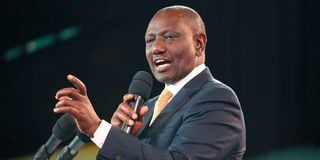Premium
Distrust in public institutions widens on Kenya governance woes

President William Ruto during a past event.
Public frustration over Kenya’s governance struggles, including corruption, lack of accountability and inefficiency has cut trust in public institutions, a new survey report shows.
The survey by pan-African research group Afrobarometer shows that while Kenyans expressed more trust in religious leaders and the army, their faith in most public institutions declined over the two years to 2023 to an average trust rating of only 47 percent, partly due to perceived disconnection, broken promises, and lack of accountability.
"While the average level of trust has declined, a closer look at three key state institutions - the president, parliament, and the courts - shows that the country differs significantly in its trends in people's trust in institutions," the report says.
Religious leaders enjoyed the highest level of trust at 72 percent, followed by the army at 66 percent. In contrast, critical sectors such as the judiciary, law enforcement, political leadership and local government suffered from increasingly low levels of trust.
Trust in the courts, a cornerstone of justice, was slightly above average at 44 percent, reflecting concerns about inefficiency, bias, and corruption within the judiciary. The sector has lost three points of trust over the 12 years to 2023. Meanwhile, trust in the police stood at just 34 percent, reflecting public dissatisfaction with allegations of corruption, brutality, and inefficiency.
According to the report, trust in the presidency fell by eight points to an average of 52 percent between 2011 and 2023, while trust in the ruling party dropped to 32 percent, underlining a significant trust deficit in the executive.
Local governments and parliament fared even worse, with trust ratings of 35 percent and 45 percent respectively; trust in parliament fell by six points over the same period.
Opposition parties fared the worst, with only 31 percent of Kenyans expressing confidence in their ability to provide credible alternatives.
"These declining levels of trust highlight systemic problems in Kenya's institutions, including corruption, lack of accountability, inefficiency, and failure to meet citizens' needs.
"This erosion of public trust undermines governance, weakens social cohesion, and hinders the implementation of policies and reforms.
"The relatively high levels of trust in religious leaders and the army suggest that citizens are turning to non-political entities for stability and guidance in the face of institutional failures," the report said.
In recent months, Kenya has seen a rise in abductions, insecurity, and concerns about human rights abuses, with civic groups denouncing the vices, in which the government denies any involvement.
According to a State of National Security report, there was a 44 percent increase in kidnappings and abductions between September 2023 and August 2024. The Kenya National Commission on Human Rights (KNCHR) reported at least 82 cases of abductions in 2024.
Afrobarometer, first published in 1999 and including Kenya since 2002, surveys public attitudes on democracy, governance, and the economy in over 40 African countries. The survey found that overall trust in African institutions and leaders averaged 46 percent.
"Trust in African institutions is low and falling. This can be a worrying trend for governments, activists, investors, citizens, and the international community, as declining trust can undermine the legitimacy of public institutions and exact a high price, especially for developing countries. In most countries, religious and traditional leaders are seen as more trustworthy than state institutions.
"The only public institution that is trusted by a majority across the continent is the military," the report stated.





